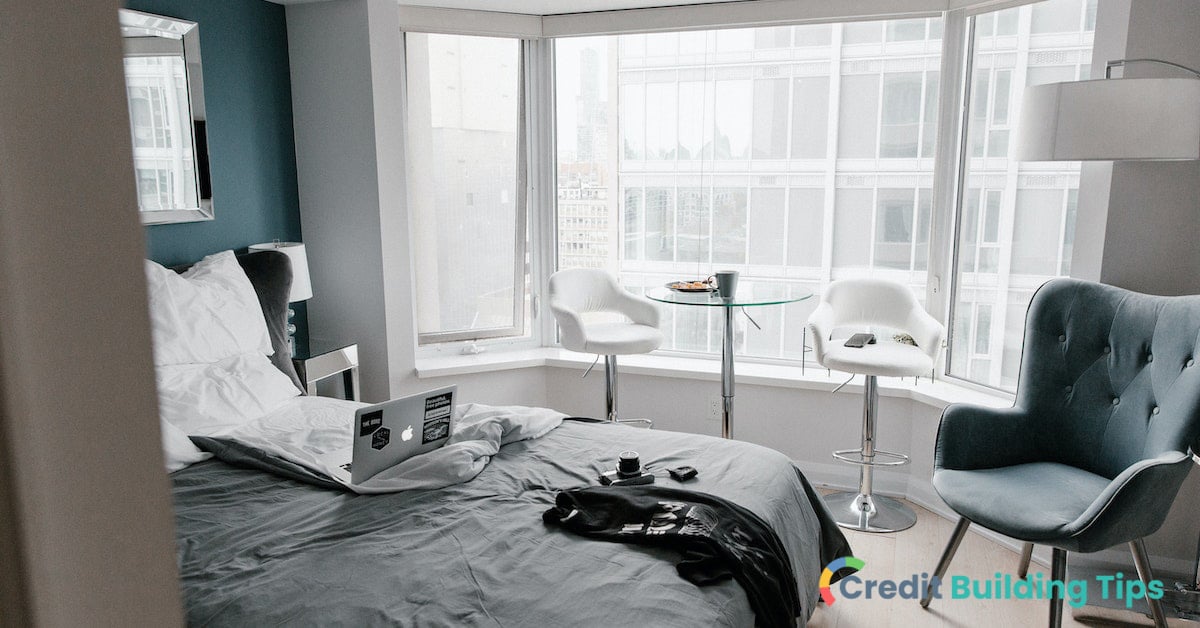Your credit score doesn't just have an impact on your ability to get a new credit card or take out a loan. It can also make it harder to find an apartment. In this article, we'll tackle the topic of renting with bad credit but high income.
Having bad credit can make your apartment search more difficult, but you'll find it's easier to score the perfect place if your income is high and you have money saved in the bank.
 There are a number of tactics you can use to rent when you make good money but don't have great credit. These include looking for landlords that don't run credit checks, offering to pay several months' rent up front, and proving your income and savings to prospective landlords.
There are a number of tactics you can use to rent when you make good money but don't have great credit. These include looking for landlords that don't run credit checks, offering to pay several months' rent up front, and proving your income and savings to prospective landlords.If you're stressed about finding an apartment with imperfect credit, don't worry. Through some combination of the following strategies, you should be able to sign a new lease in no time.
It's common for potential landlords to take a look at your credit before signing a lease. If you have a high income and are capable of making rent payments but your credit has seen better days, this can be a pretty frustrating reality.

The reason that landlords will commonly check the credit of applicants is that they want to know how likely it is that renters will pay their rent on time, every time.
Your credit history can, therefore, make a big difference in whether or not you score the apartment of your dreams. It's a good idea to check your own credit so you can get a sense of what potential landlords will see when you apply.
They will typically also scrutinize your:
There are a number of different ways that landlords will check your credit, and some will also run a background check. This means that they will probably also be searching for any criminal history or history of evictions.
If your credit is bad but you bring in a healthy salary every month, you have some options. There are a number of strategies you can use to score the apartment of your dreams even when you don't have a pristine credit history.
Thinking about buying instead of renting? Check out our posts about the credit score you need to buy a mobile home, how your credit score impacts the size of your home loan, and whether it's bad to get a new credit card before buying a house.
Perhaps one of the easiest things you can do to rent an apartment with bad credit, regardless of your income, is to look for rentals that don't require a credit check.

How easy it is to find a landlord who won't want to run a credit and background check is going to depend on your location. In some areas where most properties are owned by bigger landlords, for example, you might struggle to find any owners who won't want to look at your credit. In places where there isn't as big of a rental market and smaller landlords, though, you might have better luck.
In general, if you want to avoid a credit check during your apartment hunt, you should look for the following:
Typically, the following types of landlords or properties will require a credit check:
Another thing you can do to find an apartment when your credit is poor is to work with a real estate agent. They'll know the ins and outs of your local market and likely have a good sense of which properties won't require a credit check.
In some markets, it's very common to work with a real estate agent to find a rental.
This typically comes at a cost-- you usually have to pay a finders fee once you sign a lease. This is commonly a percentage of the rent you'll pay for a year. Depending on the rental rate, this can be a substantial amount of money, so you'll want to make sure you understand the fees before signing on with a real estate agent.
When you have a low credit score, it is an indication that you have not practiced responsible borrowing habits. This can be a red flag to landlords who simply want to rent to people who will pay on time and not cause any trouble.
If you have a high income, though, you might be able to show this to a prospective landlord in a way that will help alleviate their doubts about your trustworthiness as a renter.
You might also show them that you have access to a large credit line to help give them a little more peace of mind.
If you have a substantial amount of money saved up, it can be useful to prove this to potential landlords in addition to your high income.
In the best-case scenario, you'll be able to show that your savings account has enough money to cover move-in costs plus three months of rent.
Sometimes, people have bad credit because they have been truly irresponsible as borrowers. In other cases, though, there is a totally understandable reason for a lower-than-ideal score.
If you want to rent an apartment that requires a credit check, it's a good idea to be upfront and honest with the landlord. Having bad credit doesn't mean you're a bad person or a bad tenant, and landlords know this. If you can explain what happened that led to your credit hiccup, they might be willing to work with you.
Depending on the rental market you're in, it might be appropriate to send a letter of explanation along with your application, or it might be better to talk to the landlord in person.
You can also take the time to show your potential landlord that you are actively working to improve your credit. If you send a letter of explanation, you can discuss the concrete steps you're taking and prove that your credit score is already on the rise.
Perhaps one of the most effective strategies you can use to rent an apartment when you have a high income but bad credit is to offer to pay more than just the standard first month, last month, and security deposit.
One of the reasons landlords are skeptical of renting to people with bad credit is they're worried the tenants will miss rent payments. When this happens, landlords are still on the hook for mortgage and operating costs, which puts them in a financial bind. Beyond that, tenants who continuously miss rent payments might end up causing a legal nightmare if the landlord has to pursue an eviction.
If you offer to pay more up front, such as three months' rent on top of the standard first month/last month/security deposit, it will show the landlord that you are financially capable of paying the rent. It also lets them know that you're serious about renting the place and motivated to prove yourself as a good renter.
Beyond that, paying more upfront gives the landlord a bit more protection. They expect to generate a certain amount of income through rent, and knowing that you're paid through the first several months can make them more confident in your ability to pay on time.
Another option on the table is to find a co-signer. Also sometimes called a guarantor, a co-signer is a person that is agreeing to foot the bill if you don't pay your rent on time.
Since this is a pretty big commitment on the part of the co-signer, this role is typically played by a parent or close family member. In order for a co-signer to be useful, they will need to have good credit and, ideally, very good credit. Additionally, they will need to hand over proof of income as a part of the application process.
Landlords will often want to see that co-signers have an income that is at least 80 times the monthly rent.
Before you start looking for a co-signer, it's important to consider the potentially negative implications of this type of partnership. Mixing family and money can be a tricky business, and if you fail to pay your rent and your co-signer is forced to take responsibility for it, there's a good chance it will cause tension and strife. You never want to take on a co-signer for something you can't reasonably afford, so this is something you'll want to consider seriously before going this route.
Finally, another step you can take to score an apartment with bad credit but a high income is to consider renting with a co-tenant. Of course, it's essential that this co-tenant has good credit; otherwise, it won't help you prove your case as a responsible renter.
Not everyone is thrilled by the idea of living with a roommate, but this can be a good option if none of the others are working for you. You can save money by splitting your housing costs with another person while you work to build your credit. With attention and dedication, you'll eventually be able to rent a place of your own.
Credit scores and credit reports can feel pretty abstract a lot of the time, but the truth is that they can have a huge impact on the quality of your life. If you want to rent an apartment, for example, having bad credit can make the search much more difficult and limit your options.
That being said, having bad credit with a high income does give you some advantages compared to having bad credit with a low (or no) income. With some money coming in every month and money in the bank, you'll likely find there are some landlords out there who are willing to work with you.
If you're thinking about renting an apartment soon, but you're worried about your bad credit, it's a good idea to start working to build your credit now. For more resources about how to improve your credit and open up more financial opportunities for yourself in the future, make sure you check out our Credit Building Tips blog.